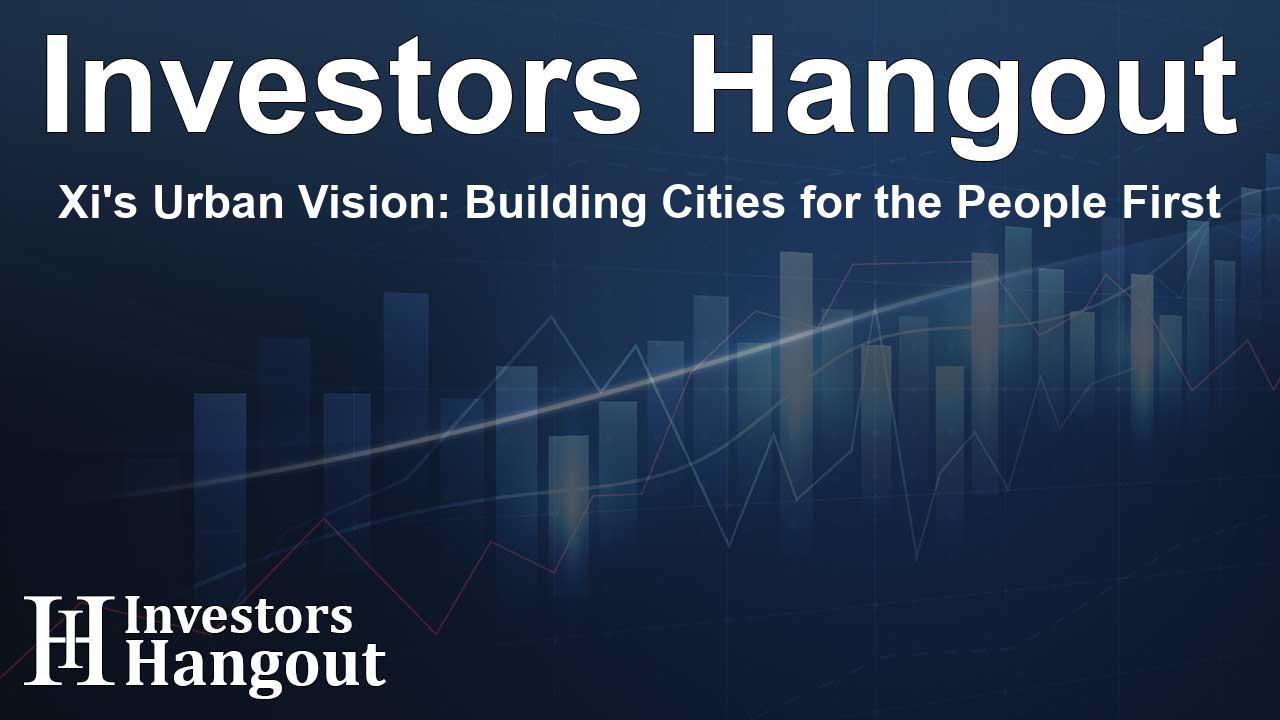Xi's Urban Vision: Building Cities for the People First

Xí’s Vision for People-Centered Urban Development
The notion of creating cities that prioritize the needs of their inhabitants is central to modern urban development in China. This vision, articulated by Xi Jinping, emphasizes that cities should be designed with the people in mind, reflecting a deep understanding of urban culture and the importance of inclusivity in city planning.
The Core Philosophy of Urbanization
Urban management reflects a natural progression shaped by its socio-economic conditions. Xi's assertion that urbanization and economic prosperity go hand in hand underscores this relationship. He advocates for an urban landscape that allows inhabitants to enjoy natural beauty and maintain links to their roots, enhancing their quality of life.
People First in Urban Planning
Improving everyday living standards remains pivotal to effective urban planning. Xi articulates that decisions in city planning should be guided by how they affect the well-being of residents. This philosophy is integral to ensuring that residential areas provide comfort and connectivity, allowing people to thrive in their environments.
A Holistic Approach to Housing and Environment
Quality housing is fundamental in achieving urban livability. In his time in Fujian Province, Xi implemented housing reforms to upgrade living standards, emphasizing the necessity of adapting urban spaces to fit the current needs of residents while considering future growth.
Balancing Growth with Sustainability
The vision for urbanization extends beyond mere construction; it includes ecological awareness. Recent findings, like the discovery of new species in rehabilitated wetlands, illustrate the success of integrating nature within urban developments, showcasing a commitment to respecting the environment through thoughtful urban design.
Lessons from Xiong'an and Beyond
The Xiong'an New Area exemplifies this balanced approach, merging urban growth with ecological conservation. Urban projects here illustrate how modern cities can coexist with their natural surroundings, aiming to create a livable space that honors cultural heritage while promoting sustainable practices.
Modern Infrastructure Meets Enhanced Quality of Life
As global urbanization trends shift towards greener cities, local governance structures adapt to encompass sustainable development goals. Xi advocates for the thoughtful integration of technological advancements in urban planning, fostering smarter cities where innovation enhances governance and service delivery.
Community Engagement and Urban Governance
Meaningful civic engagement is essential in urban governance. Xi calls for engaging the community in decision-making processes, revamping traditional governance systems to be more inclusive and responsive to citizens' needs, fostering a collaborative spirit between government and community.
Preserving Cultural Heritage
Maintaining a connection with historical roots is vital for a city’s identity. Xi emphasizes protecting cultural relics and fostering an appreciation for local heritage as integral components of urban governance, cherishing the historical narratives that shape communities.
Future Directions for Chinese Urbanization
As urbanization progresses, China faces the unique challenge of accommodating its vast population while ensuring quality of life. Xi's framework for urbanization is tailored to address this complexity, promoting a strategic blend of historical preservation and modern urban needs.
Frequently Asked Questions
What is Xi’s vision for urban development?
Xi envisions cities that prioritize the people’s well-being, blending livability with sustainable practices and cultural heritage.
How does urbanization relate to economic growth?
Urbanization is seen as complementary to economic development, where improved urban areas support economic expansion and quality of life.
What role does public participation play in urban planning?
Engaging citizens in urban planning ensures that developments meet community needs and fosters a sense of ownership and responsibility.
How are ecological considerations integrated into urban governance?
Xi emphasizes ecological restoration in urban planning, advocating for developments that respect and benefit the environment while promoting urbanites' quality of life.
Why is cultural heritage important in urban development?
Cultural heritage preserves historical narratives that foster community identity and connection, enriching the urban experience for residents.
About The Author
Contact Riley Hayes privately here. Or send an email with ATTN: Riley Hayes as the subject to contact@investorshangout.com.
About Investors Hangout
Investors Hangout is a leading online stock forum for financial discussion and learning, offering a wide range of free tools and resources. It draws in traders of all levels, who exchange market knowledge, investigate trading tactics, and keep an eye on industry developments in real time. Featuring financial articles, stock message boards, quotes, charts, company profiles, and live news updates. Through cooperative learning and a wealth of informational resources, it helps users from novices creating their first portfolios to experts honing their techniques. Join Investors Hangout today: https://investorshangout.com/
The content of this article is based on factual, publicly available information and does not represent legal, financial, or investment advice. Investors Hangout does not offer financial advice, and the author is not a licensed financial advisor. Consult a qualified advisor before making any financial or investment decisions based on this article. This article should not be considered advice to purchase, sell, or hold any securities or other investments. If any of the material provided here is inaccurate, please contact us for corrections.
